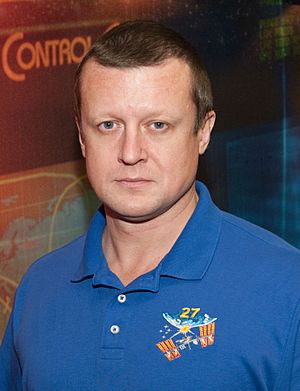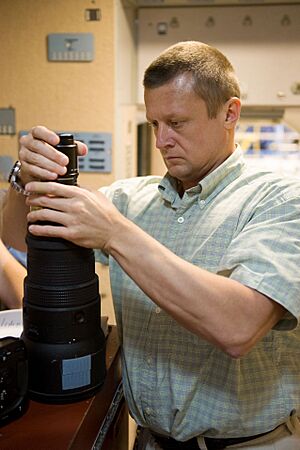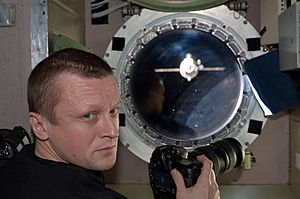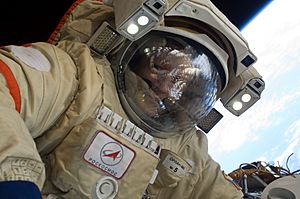Dmitri Kondratyev facts for kids
Quick facts for kids
Dmitri Yuryevich Kondratyev
Дмитрий Юрьевич Кондратьев |
|
|---|---|
 |
|
| Born | 25 May 1969 |
| Status | Retired |
| Nationality | Russian |
| Occupation | Colonel, Russian Air Force |
| Space career | |
| Roscosmos cosmonaut | |
|
Time in space
|
159d 7h 17m |
| Selection | 1997 Cosmonaut Group |
|
Total EVAs
|
2 |
|
Total EVA time
|
10 hours, 13 minutes |
| Missions | Soyuz TMA-20 (Expedition 26/27) |
|
Mission insignia
|
  |
Dmitri Yuryevich Kondratyev is a retired Russian cosmonaut. He was born on May 25, 1969, in Irkutsk, Russia. He flew to space for the first time in December 2010.
During his time in space, Kondratyev was a crew member on the International Space Station (ISS). He served as a Flight Engineer for Expedition 26 and later became the Commander for Expedition 27.
Contents
About Dmitri Kondratyev
Dmitri Kondratyev is married to Dinara, and they have a son named Vladislav. His parents live in Alma-Aty, Kazakhstan. When he's not working, Dmitri enjoys computers, karate, learning about economics, and fishing.
Dmitri's Education and Training
Dmitri Kondratyev has a strong background in aviation and economics.
- In 1986, he learned to fly Yak-52 planes at the Alma-Aty Aviation Club.
- He then joined the Kacha Air Force Pilot School and became a pilot-engineer in 1990.
- In 2000, he earned a degree in economics from the Moscow State University for Economy, Statistics and Computer Science.
- He continued his studies at the Yuri A. Gagarin Air Force Academy, graduating in 2004.
Dmitri's Experience as a Pilot
After finishing pilot school in 1990, Dmitri Kondratyev became a pilot in the Russian Air Force. He flew several types of Russian fighter jets, including the MiG-21, MiG-29, and Su-27. He is considered a top-level Air Force pilot.
Besides flying, Kondratyev is also an expert in parachute training. He has completed more than 150 parachute jumps!
Becoming a Cosmonaut
Dmitri Kondratyev was chosen to become a test-cosmonaut in December 1997. He spent over two years, from January 1998 to March 2000, training for space missions. After this training, he officially became a test-cosmonaut.
He trained as a backup crew member for several ISS missions, including Expedition 5 and Expedition 20. From 2006 to 2007, he worked at the Johnson Space Center in the United States, helping with Russian space operations. He also earned his U.S. pilot licenses in 2007 and 2009.
His Mission: Expedition 26 and 27
Dmitri Kondratyev was chosen to be the Soyuz Commander for his mission to the ISS. He also became the Commander of Expedition 27. He launched into space on December 15, 2010, aboard the Soyuz TMA-20 spacecraft.
Spacewalks: Working Outside the ISS
While on the International Space Station, Dmitri Kondratyev took part in two spacewalks. A spacewalk is when astronauts or cosmonauts leave the spacecraft to work in the vacuum of space. He performed these spacewalks as a Flight Engineer and Commander for Expeditions 26 and 27.
First Spacewalk: Russian EVA #27
Dmitri Kondratyev's first spacewalk, called Russian EVA #27, happened on January 21, 2011. He worked with fellow cosmonaut Oleg Skripochka. Their main goal was to install a new high-speed data system on the space station.
The spacewalk lasted for five hours and 23 minutes. They opened the hatch of the Pirs module and began their work outside. They successfully set up an antenna for a system that helps send large amounts of data from the Russian part of the station to Earth.
During this spacewalk, they also removed some old equipment. This included a plasma pulse generator and an experiment called Expose-R, which had been left open to space conditions to see how materials reacted. They also installed a new camera for the Rassvet module, which helps with docking spacecraft.
Second Spacewalk: Russian EVA #28
On February 16, 2011, Kondratyev and Oleg Skripochka went on their second spacewalk, Russian EVA #28. They had several tasks to complete outside the station.
Their work included installing a radio antenna and deploying a small satellite. They also set up two new experiments:
- The Molniya-Gamma experiment, which studies gamma rays and light during lightning and thunder on Earth.
- Another high-speed data transmission system.
Finally, they retrieved two panels from an experiment called Komplast, which had been exposed to space.
See also
 In Spanish: Dmitri Kondrátiev para niños
In Spanish: Dmitri Kondrátiev para niños
 | George Robert Carruthers |
 | Patricia Bath |
 | Jan Ernst Matzeliger |
 | Alexander Miles |




